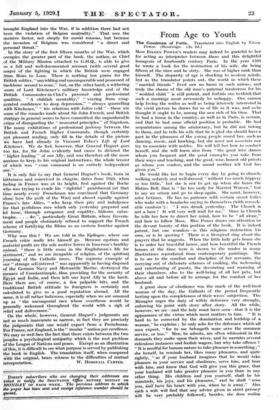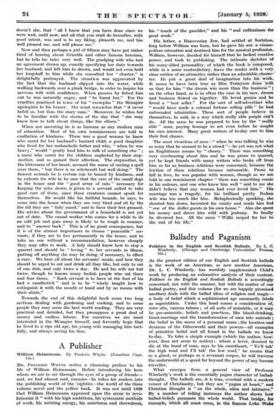Ftom Age to Youth
The Goodman of Paris. Translated into English by Eileen Power. (Routledge. 12s. 6d.) Miss EILEEN POWER'S readers may indeed be grateful to her for acting as interpreter between them and this delightful bourgeois of fourteenth century Paris. In the year 1393 he wrote a book for the instruction of his wife, she being fifteen at the time and he sixty. She was of higher rank than himself. The disparity of age is shocking to modern minds, but as the translator points out, the world in which these ." married friends " lived saw no harm in such unions, and truly the charm of the old man's paternaltenderness for his `` wedded child " is still potent, and forbids one to think that such a marriage must necessarily be unhappy. One cannot help loving the writer as well as being intensely interested in the vivid picture he draws for us of life as it was, and as he thought it ought to be, among the new rich of his time. That he had a house in the country, as well as in Paris, is certain, and that he had some official position is probable. He had acquaintance among the aristocracy, but he did not belong to theM, and he tells his wife that he is glad she should have a part in the pleasures of the young people round her, such as dancing, music, and hawking, but she must riot associate-nor try to associate with nobles. He will tell her how to conduct herself, and she will learn also from the good wise dailies whom you frequent and the good examples you take from their ways and teaehing, and the good, wise, honest old priests to whom you cOnfess, and the sound mother wit God has given you." _
He would like her to begin every day by going to church, walking sedately and Well:dressed " without too much frippery or too little," but she is not to get up when she heirs the
Matins Bell, that far too early ffir Married "'Women," but to say an orison and go to sleep again. She must, however, arise betimes. He has no patienee with certain smart ladles who wake with a headache saying to theniselVes (with remark- able candour !) : " I was drunk yesterday. The ChurCh is not a hare ! It will eery well wait for me." Onee in Church he tells her how to direct her' mind, how to "be " all alon"e," and how to follow Mass. Miss Power draws our attention to the devout beauty of this portion of the book. It' is indeed Patent, but one wonders—ii thiS religious instruction his own, or is he quoting ? There is a liturgieal ring about the prayers that he suggests. When the little lady gets home she is to order her beautiful house, and how beautiful the French houses at the time were is shown to the reader in many illustrations reproduced from contemporary paintingS. She is to see to the comfort and discipline of her servants, the carrying out of elaborate schemes of cooking, the welcoming and entertaining of guests, the decorating and warming of their chambers, also to the well-being of all her pets, but above all and before all to arrange for the comfort of her husband.
A great show of obedience was the mark of the well-bred woman of the day, the Gallants of the period frequently betting upon the completeness of their wives' subjection. The
Menagier urges the duty. of wifely deference very strongly, enforcing his point with story after story. All the while,
however, we see—and the lady must have seen—that it is the
appearance of the virtue which most matters to him. " It is hard to be corrected by' the domination and lordship of a woman," he explains ; he only asks for the deference which all
Men expect, " for to me belongeth none save the common service, or less." Men, he admits, are Often whiinsidal in' the demands they make upon their wives, and he narrates several ridiculous instances and foolish wagers,- but why take offence ? " It is needful for human nature to take pleasure in something ; she herself, he reminds her, likes many pleasures, and quite rightly, ," so if your husband imagines that he would take PleaStire in your service "and obedience, serve him, and bear
with him, and knoyi that God will give you 'this grace; that your husband will take greater pleasure in you than' in any other thing. His children and you yourself, shall be his Minstrels," his joys; and his pleasurea,"- and he 'shall " miss . , . . with you, . .
you, and have his heart with you, when he is away." AlsO
such a Wife will find that any advice given in strict privacy will lie VerY prolxibl?i folloWed; besides, she does realize
doesn't she, that " all I know that you have done since we were wed, until now, and all that you shall do hereafter, with good intent, was and is to my liking, pleaseth me, and Ili well pleaSed me, and will please me?'
Now and then perhaps a girl of fifteen may have got rather tired of hearing about Griselda and -other famous heroines, but he tells his tales very well.- The grudging wife who had an agreement drawn up, exactly- specifying her duty towards her husband, and left him to drown, and would not even NM her longstaff to him while she consulted her " charter," is delightfully portrayed. The situation was aggravated by the fact that the .husband slipped into the water, while walking backwards over a plank bridge, in order to inspire his nervous wife with confidence. When passers by fished hini ofit he was naturally angry, and " he burnt her." For the cruelties' practised in some of his " exemplaS " the Menagier apologiies to his hearer. She must remember that " it never befell so, but -thus the story runs." Moreover, he wishes her to be familiar with the stories of the day that " she may know how .to talk about things, hie the others."
When not narrating he is as humane as any' Modern man of education. Most of his own reminiscences are told in exaltation of kmdness. There 'was a good woman he knew who cared for her husband's bastard child, a good daughter who lived for her melancholic father and who, " when he was heavy," would " gently lead him to talk of something else " ;
nurse who cared for the children neglected by their step-
Mother, and. so gained their affection: The stepmother,the bitterness of her heart, accused the nurse of casting a spell Over them, " but there is no witchcraft but well doing." The fiercest animals he is certain can be tamed by kindness, and he exhorts his wife to be sure that the care Of the small dogs in the house and the " good array of cats " necessary for keeping the mice down, is given to a servant suited to take good care of them, since these creatures cannot speak for themselves. He would like his faithful hounds, he says, to come into the house when they are very tired and sit by the fire till they are " fully eased," and to have their feet greased. His advice about the government of a household is not yet out of date. The casual warker: who comes for a while to de an odd job and goes away is likely to be rough in manner, and to " answer back." This is of no great consequence, but it is of the utmost importance to choose " peaceable " ser- Vants, if they are to live permanently in the house, and to take no one without a recommendation, however cheaply they may offer to work. A lady should know how to stop a quarrel and should be " loving " to her servants in illness, putting off anything she may be doing, if necessary, to effect a cure. We hear all about the servants' meals, and how they should be urged to eat and drink all they like, but only to eat of one dish, and only twice a day. He and his wife eat but twice, though he knows many foolish people who eat three and four times. " Each servant is to have at the foot of his bed a candlestick " and is to be " wisely taught hovi to extinguish it with the mouth or hand and by no means with their shirts."
Towards the end of this delightful book come two long sections . dealing with gardening and cooking, and to some people they may seem the best worth reading. They are very practical and detailed, but they presuppose a great deal of money and endless labour. For ourselves we are most interested in the Menagier himself, and fervently hope that he lived to 'a ripe old age, his young wife managing him tact- fully, and always saving his face.







































 Previous page
Previous page